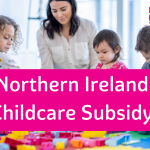Affordable childcare motion at Stormont receives cross-party support
The first full sitting of the Northern Ireland Assembly on Monday 12 February saw the introduction of a motion on affordable childcare by Sinn Féin. The motion is follows:
“That this Assembly recognises that the costs of childcare are unaffordable for many and that hard-working families are struggling every month to meet these costs; further recognises that the childcare sector is in need of urgent and significant investment in order to put the sector on a sustainable footing, to improve terms and conditions for workers and to deliver the high-quality and accessible provision that families and children deserve; notes that without affordable childcare provision many people, particularly women, are unable to take up or return to employment; agrees that affordable childcare would have a hugely positive impact on our local economy; acknowledges that high-quality childcare and early years education can help to give children the best start in life, support children with special educational needs (SEN) to help address educational disadvantage and promote emotional health and well-being amongst children; and calls on the Executive to work collectively to deliver a strategy that makes high-quality childcare, affordable for all families, a priority.”
The motion was introduced by Nicola Brogan, MLA Chair of the All Party Group on Early Education and Childcare. She reflected on the important learning the All Party Group has delivered over the last number of years, taking evidence from other jurisdictions and sharing the experiences of key stakeholders. Together with the motion she called on the Education Minister to set out a clear timeline for delivery of a top class early learning and childcare strategy.
Following introduction of the motion, Robbie Butler, MLA (UUP) moved the following amendment:
Leave out all after the last “help” and insert: “prevent educational disadvantage and promote emotional health and well-being amongst children; calls on the Minister of Education to listen to the views of parents and businesses by way of a deliberate consultation; and further calls on the Executive to work collectively to deliver a strategy that makes high-quality childcare, affordable for all families, a priority.”
He highlighted the importance of investing in quality childcare for children with special educational needs and to ensure a ‘children’s right’s impact assessment’ is used to maintain development of the new strategy centred on the child.
A lengthy discussion of the motion followed, with interventions from MLAs from across all parties, including a number who were making their maiden speeches to the Assembly, having been elected in May 2022. Members of the newly re-established Education Committee, that will be scrutinising the development of the new Childcare Strategy, shared their priorities for early learning and childcare including new Chair Nick Mathison (Alliance), Kate Nicholl (Alliance), Cheryl Brownlee (DUP), and Cara Hunter (SDLP). Other key issues raised reflected:
- The need to value early learning and childcare properly as societal, educational and economic infrastructure
- Childcare’s role in supporting parents, particularly mothers, to work
- The importance of investing in the childcare workforce
- Learning from other jurisdictions to develop a bespoke strategy and affordability scheme for Northern Ireland
- Urgent pressures facing the sector and families, requiring immediate intervention as work continues on the longer term strategy
- The role of quality, affordable childcare in tackling disadvantage and poverty
- That childcare must be accessible and affordable for every child and for every family.
The debate concluded with a contribution from the Education Minister, Paul Givan, MLA (DUP) who started by saying: “I assure the House that the development of an early learning and childcare strategy is a top priority for me as Education Minister”.
He committed to bringing a paper to the Executive meeting on Thursday 15 February 2024. He was asked by his party colleague, deputy First Minister Emma Little-Pengelly, MLA to confirm “that urgent actions will also be required, and that he will bring some of those immediate actions to support parents in crisis at the minute and the childcare settings that are really struggling.”
The Minister again reiterated that this was a priority for him, and for the Executive as a whole, but emphasised that it would require ‘buy-in’ from other departments. He identified the first priority is to “stabilise and further develop the services as we seek to address issues of underinvestment” and recognised the need to learn from the implementation of support schemes in other countries.
He was clear that any new support needs to align with existing Government financial support and outlined his wish to see an increase to the support available through the Tax-Free Childcare scheme.
Speaking about the plans to increase the levels of pre-school education provision, he reiterated the ambition to move to providing 22.5 hours of pre-school education for all children. The Minister referred to the DUP’s manifesto commitment of 30 hours free childcare for families, but reflected that there have been implementation issues with this scheme and there are opportunities to learn from other jurisdictions to develop a bespoke scheme for Northern Ireland.
Funding
Bringing his remarks to a close, the Minister outlined some detail on the budget that would be required to deliver these commitments on childcare, identifying the annual and recurring costs to be up to £400 million, which he described as a “relatively conservative estimate”. This total was broken down as follows:
- £35 million to standardise the pre-school education programme at 22.5 hours for every child
- £40 million to support Sure Start, the pathway fund and Toybox
- £50 million to support sector sustainability, workforce development and children with additional needs
- £270 million to provide 30 hours free childcare for children from nine months to age four.
Further detail is needed to better understand what this funding is for, whether there are eligibility criteria, and what other options have been costed.
Conclusion
The motion was wound up by Liz Kimmins, MLA (Sinn Féin) who thanked everyone who had spoken in support of the motion, and asked all parties to support the motion. The motion was again put to the House and was agreed to.
Speaking following the Assembly debate, Aoife Hamilton, Employers For Childcare commented: “We very much welcome the cross-party support on this critical issue and its recognition as a day one priority for the newly restored Executive. This is a result of years of campaigning from Employers For Childcare, and colleagues across the sector, and we were delighted to hear this referenced in the Assembly chamber. But the work isn’t done. The time for warm words is over, we need to see urgent action to address the challenges that are being faced by families and childcare providers right now. We look forward to reviewing the proposals that Minister Givan has pledged to bring to the Executive this week, and to continuing to work constructively with all parties and stakeholders across the sector to ensure the new Early Learning and Childcare Strategy provides an ambitious and bespoke solution for Northern Ireland, learning from what is in place elsewhere. We have requested a meeting with the Education Minister and look forward to discussing these issues with him in detail at the earliest opportunity”.






